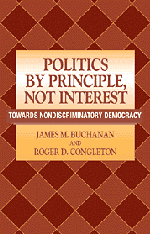Book contents
- Frontmatter
- Contents
- List of figures and tables
- Preface
- Acknowledgements
- PART ONE INTRODUCTION
- PART TWO ANALYSIS
- PART THREE APPLICATION
- 6 Generality and externality
- 7 Market restriction and the generality norm
- 8 The political efficiency of general taxation
- 9 Deficit financing and intertemporal discrimination
- 10 Generality and the supply of public services
- 11 Generality and redistribution
- 12 Generality without uniformity: Social insurance
- 13 Generality without uniformity: Federalism
- PART FOUR PROSPECT
- Endnotes
- References
- Index
11 - Generality and redistribution
Published online by Cambridge University Press: 27 March 2010
- Frontmatter
- Contents
- List of figures and tables
- Preface
- Acknowledgements
- PART ONE INTRODUCTION
- PART TWO ANALYSIS
- PART THREE APPLICATION
- 6 Generality and externality
- 7 Market restriction and the generality norm
- 8 The political efficiency of general taxation
- 9 Deficit financing and intertemporal discrimination
- 10 Generality and the supply of public services
- 11 Generality and redistribution
- 12 Generality without uniformity: Social insurance
- 13 Generality without uniformity: Federalism
- PART FOUR PROSPECT
- Endnotes
- References
- Index
Summary
In Chapter 10 we examined how the generality principle might be applied to constrain the productive state. In this chapter we examine the majoritarian politics of the transfer state. Here the role of government is not always so evident as in arguments supporting the production of public goods. Generality, narrowly conceived, cannot really apply to the transfer state insofar as transfers, by definition, involve unequal treatment in the sense that transfers imply the existence of net taxpayers and net transfer recipients. On the other hand, transfer programs can be more or less general and can run more or less afoul of the political inefficiencies associated with nongeneral programs. Can an argument comparable to that developed in support of general taxation and the production of public services be made to the effect that the generality norm should be extended to the transfer side of the fiscal account? And what would generality mean in this context? What is the transfer side equivalent of the flat-rate income tax? And, given the possible constitutional enforcement of generality, could the modern welfaretransfer state remain both majoritarian in its politics and viable in its economics? Or does the welfare-transfer state depend for its very survival on discriminatory departures from any generality principle?
We propose to analyze the working of majoritarian politics in a constitutional setting that allows government spending that is not limited to the financing of public goods but is directed explicitly to particular individuals and groups in the form of monetary transfers.
Information
- Type
- Chapter
- Information
- Politics by Principle, Not InterestTowards Nondiscriminatory Democracy, pp. 117 - 128Publisher: Cambridge University PressPrint publication year: 1998
